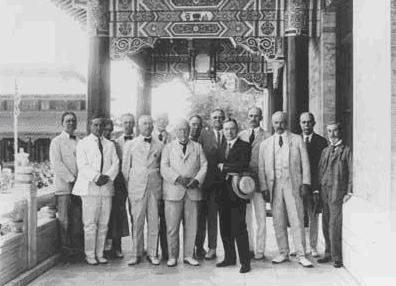 科室新闻
科室新闻
黄洁夫部长访问芝加哥医学院源自:
When Rockefeller founded the University of Chicago in 1892, he wanted to include a medical school. The faculty opposed the idea, so he started the Peking college in China in 1906.
Over the years the Medical Center's relationship with Peking college has waxed and waned, but on October 22 the two institutions signed a memorandum of understanding to exchange faculty, researchers and students; share scientific information and materials; conduct collaborative research; and hold joint seminars and symposia.
“This is a critical time to rekindle our relationship with the Medical Center,” said Huang Jiefu, MD, vice minister of health for the People’s Republic of China, professor of hepatobiliary surgery at Peking, and one of eight Chinese physicians and administrators who came to campus to celebrate the agreement. “China is seeing tremendous political reform, and decades of growth have created an economic miracle. Now we want to foster a miracle in health care reform, too.”
The memorandum of understanding comes at a time when the university is preparing to open a center in Beijing that will support and promote such scholarly collaborations across the disciplines.
The agreement is being formed under the auspices of the Global Health Initiative headed by
“China is a fast growing, increasingly important country,” she said. “This agreement will make the exchange of ideas and people in both directions seamless.”
GHI conducted an audit of places around world where faculty members were engaged—or wanted to be, Olopade added. China was number one on both lists.
The China Medical Board, also founded by Rockefeller, played a crucial role in bringing Peking college and the Medical Center back together. The board is an independent U.S. foundation that aims to advance health in China and neighboring countries by strengthening medical, nursing and public health research and education. Founded in 1914, its initial charge was to help establish and operate Peking college. It did so until 1950 when it withdrew at the request of the Chinese government.
In 1980 the board accepted an invitation from the Chinese government to return. Since then, it has been helping China address medical issues, including the ethics of organ transplantation.
Until recently China had an unregulated transplant system that relied on organs from executed prisoners. To reform this, the board suggested that Jiefu and Peking consult with the Medical Center’s Transplant Section and MacLean Center for Clinical Medical Ethics. These relationships provided the catalyst for Peking college and the Medical Center to reconnect.
Over the past 10 years, Jiefu worked closely with J. Michael Millis, M.D., section chief of transplantation and director of the Transplant Center.
“Because of Dr. Jiefu, transplantation in China has changed dramatically,” Millis said. “It’s now handled more openly, and China is talking about abolishing the death penalty, which would completely alter how it operates its transplant industry.”
Major transplant reforms introduced in 2007 have been recognized by the World Health Organization and other international bodies, Jiefu said. “That was a first step, but more reforms are needed, and in process.”
Other medical issues that both parties want to explore together include Hepatitis B and hepatocellular carcinoma. Being one of the few people who has worked at both institutions, Yang-Xin Fu, professor of pathology, hopes to play a role in the new collaboration.
“We could have a big impact in China through Peking college because it is widely considered the most prestigious medical school in China and houses the Chinese Academy of Medical Sciences,” Fu said. “Through Peking college we could train the trainers about a new approach to health care. At the same time, China would be great for clinical trials because of the different patient pool.”
Another advantage of working with health care providers in China would be to help combat infectious diseases such as SARS, H1NI and Avian Flu that cross borders more rapidly than ever, Jiefu said. “China wants to be a responsible member of the global health care community.”


